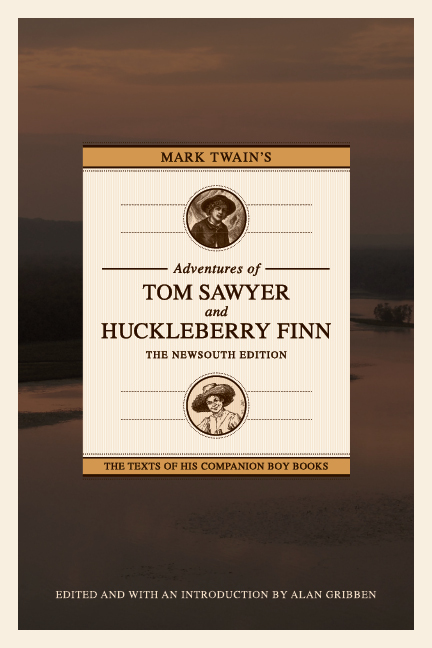
Dr. Alan Gribben, editor of Mark Twain’s Adventures of Tom Sawyer and Huckleberry Finn: The NewSouth Edition, discussed the new volume this past month with the Costo Connection and Independent Publisher magazines. Each magazine gave Gribben the opportunity to continue to explain his motivation for releasing the edition, which offers replacements for the racial epithets found in the original text.
In the “Informed Debate” section of the May 2011 edition of Costo Connection, the magazine asks, “Should literary classics be sanitized,” noting that “the original version of [these books have] been banned in some schools and libraries … [supporters] say a revised edition maintains the mood, context, and style of the original; allows everyone to enjoy the work; and encourages reading.” Customer Randi Wilkinson writes, “Parents can expose their children to the original edition if they feel the kids are mature enough, or they can read the revised edition now.”
In the Costo Connection, Gribben explains that public schools have been “increasingly reluctant” to assign Twain’s works because of the epithets within, such that many students never encounter Twain at all; “the NewSouth Edition,” Gribben continues, “offers readers a chance to sidestep the “n-word†acrimony that has dominated and distorted public discussions of Tom Sawyer and Huckleberry Finn for 40 years [and] focus on deeper messages in these novels: the thrill of adventures that lead to discoveries, the yearning for freedom that makes terrible risks worthwhile and the price of social conformity that blinds people to immoral practices.”
Gribben presents more details in his Independent Publisher column, describing his early statewide speaking tour to tout Twain’s works at Southern schools, and the conversations he had with public school teachers who told him they weren’t allowed to teach Tom Sawyer and Huckleberry Finn because of the epithets. Gribben writes:
It occurred to me that I was equipped by my lifetime of studying and teaching Mark Twain to prepare an edition of Twain’s two novels that could offer teachers and school districts a workable alternative to avoiding the books. After all, I had reconstructed Twain’s library and reading in a 1,000-page catalog, co-edited a collection of his travel writings, and published numerous essays investigating his biography, prose style, and celebrity image. What if I produced an edition of both Tom Sawyer and Huckleberry Finn that retained every phrase, sentence, and chapter in them except the offensive racial slurs? …
Although my publishers at NewSouth Books, Randall Williams and Suzanne La Rosa, had expressed initial reservations about whether we would be able to sufficiently alert teachers to the availability of this niche edition, that concern of theirs soon turned out to have been needless, to put it mildly. … The Wall Street Journal reported nearly 60,000 posts about the edition on Twitter and Facebook within a four-day period in January. Debate teams at high schools and colleges eagerly took up its implications. College and local newspapers tussled with the issues involved. … I sensed an enormous disconnect between the university and media intelligentsia and the world of the public school teacher. Early critics of the edition at least took into account my scholarly record and credited me with being “well-intentioned,†but as bloggers fanned the flames with falsehoods the subsequent commentators were not so kind. …
During the weeks preceding the volume’s appearance, media pundits and entertainment personalities on radio and television exaggerated the news to make it seem as though all other existing editions of the two novels would hereafter be abolished. People outside academe wrote to me in consternation, fearful that they would never again be able to read the original versions of Twain’s novels. I referred them to the relevant part of my Introduction citing authoritative editions that do contain the n-word and urging readers to consult them. I had to laugh whenever the professional commentators avoided pronouncing or printing the very word they were mocking me for substituting and that they are expecting public school teachers to read aloud in integrated classrooms. The editors’ newspapers routinely reject letters to the editor that contain the word. Media broadcasters and columnists know that their own jobs would be forfeited if they dared to violate a tacit protocol by uttering or publishing that dreaded word. …
My publishers resolutely refused to halt or postpone the NewSouth Edition in spite of the invectives hurled at them, and more than a month after its issuance the tide began to turn. “60 Minutes†and its CBS television affiliates aired on March 20, 2011 … a probing debate in which one teacher acknowledged the “pain†that the n-word inflicts in high school classrooms. For the most part, hostile commentary about the edition dampened after that. Besides, readers were now able to obtain copies of the book and see for themselves the Introduction and notes. The publisher and I soon received grateful letters of support from classroom teachers who had given up on assigning Huckleberry Finn. “It is a great move on your end,†wrote one high school instructor.
Dr. Alan Gribben’s full column, “Huck Finn and Tom Sawyer Go Back to School,” is available from the Independent Publisher website. Read “Informed Debate” from Costo Connection at www.costcoconnection.com.
Mark Twain’s Adventures of Tom Sawyer and Huckleberry Finn: The NewSouth Edition is available from NewSouth Books, Amazon, or your favorite local or online book retailer.
